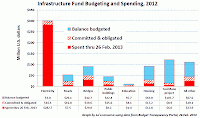Although the President's office did not make his letter public, La'o Hamutuk obtained it from Parliament and is making it available in Portuguese and our unofficial English translation, which follows (links and graphics added by La'o Hamutuk).
President of the Republic
GENERAL STATE BUDGET (GSB) FOR 2013
General Notes and Recommendations
1. The President notes that the rate of execution of the State Budget for 2012 will have been about 70%, and this corresponds to spending of approximately USD $1,200 million. In the GSB for 2013, the Ad-hoc Committee submitted an alternative proposal (to the initial proposal of $1,797.5 million) of $1,647 million. This proposal was approved with 64 votes in favor and 1 abstention.
2. Of the total value of the Infrastructure Fund planned for 2012, only 49% of the funds were spent. If you exclude the funds for the electrification project of the country, the rate of execution of the Infrastructure Fund in 2012 was significantly lower: 29%.
3. The total expenditures of the 2013 State Budget are $1,647.519 million, which was reduced by $155 million (-8.3%) from the Government’s initial proposal. This reduction is mainly achieved through reduced expenditure on Development Capital / Infrastructure (-$135 million) and a decrease of $20 million in spending on goods and services. The reduction in goods and services is due to the fact that this budget will be approved 2 months later than what the law determines (1 January 2013).
4. “The $1,501.219 million fiscal deficit of the state budget”, “is financed with $787 million from the Petroleum Fund, $43.6 million through the use of public credit” (soft loans from international donors), “$409.8 million in the balance carried forward from Special Funds” (mainly the Infrastructure Fund), and “$260.8 million from the balance in the Treasury Account.”
5. The President welcomes the reduction in the amount of the state budget compared with last year. However, taking into account the history of low rates of execution, the President draws attention to the urgent need to complete the execution of this budget. There appears to have been a high tone of optimism in the definition of expenses to carry out, especially for projects that end up not being executed.
6. The President notes that the relative abundance of financial resources has given rise to speculative projects with inflated prices with significantly prejudice to the public interest.
7. The President welcomes the statements made by Members of Parliament as well as the affirmation of the Prime Minister, with respect to the functions of supervision and monitoring of project execution through quarterly meetings to take place between the Parliamentary Standing Committees and the respective members of the Government. The President believes that these actions will better protect the national interest.
8. Average annual rates of inflation reached 13.5% in 2011 and 11.8% in 2012. The President hopes that this GSB can contribute to reducing inflation that the country has suffered during the last two years. These values greatly reduce the purchasing power of civil servants, mainly those who earn lower wages, and especially citizens with low incomes.
9. The President notes that, on the one hand, in the structure of expenditure in this State Budget, 46% is allocated to the construction of infrastructure, prioritizing spending on electrification of the country, road reconstruction and the Tasi Mane project. On the other hand, there is much less spending in key areas of human development -- education receives only 5.6%, health receives 3.7% -- and agriculture, which involves about 80% of the population, gets only 1.5% of the total budget.
10. The President welcomes the special allocation for Oecusse. However, he regrets the lack of a budget for the “planning” of Dili, the capital of the Republic which welcomes the diplomatic community and is the main gateway to the Country.
11. Regarding the Tasi Mane project on the South Coast, the President understands the reasons that appear to justify not having changed the intended amount. However, he would like to see a public explanation of the reasons for allocating these funds, in particular when compared with other expenses with obvious social utility. For example, two kilometers of highway are likely to cost $20 million and the budget allocated to agriculture is about $25 million.
12. The President was informed that losses caused by illegal fishing amount to more than $200 million per year. The President regrets not finding an adequate response to this problem in this budget, which continues to affect the potential for national fishing.
13. With regard to domestic revenues, the President hopes that the efforts of the Executive for better tax administration and collection of taxes, duties and other revenues will be effective. The President intends to urge firm measures to combat tax evasion and capital flight, which will allow for greater prudence in using money from the Petroleum Fund.
14. Responding to unemployment is an unavoidable necessity. The President hopes that this GSB can generate more permanent jobs, contributing to a significant reduction in poverty that affects more than 50% of households in the interior of our Country. The President also hopes that this budget will contribute to a tangible decrease in the asymmetry between the capital Dili and other districts.










No comments:
Post a Comment